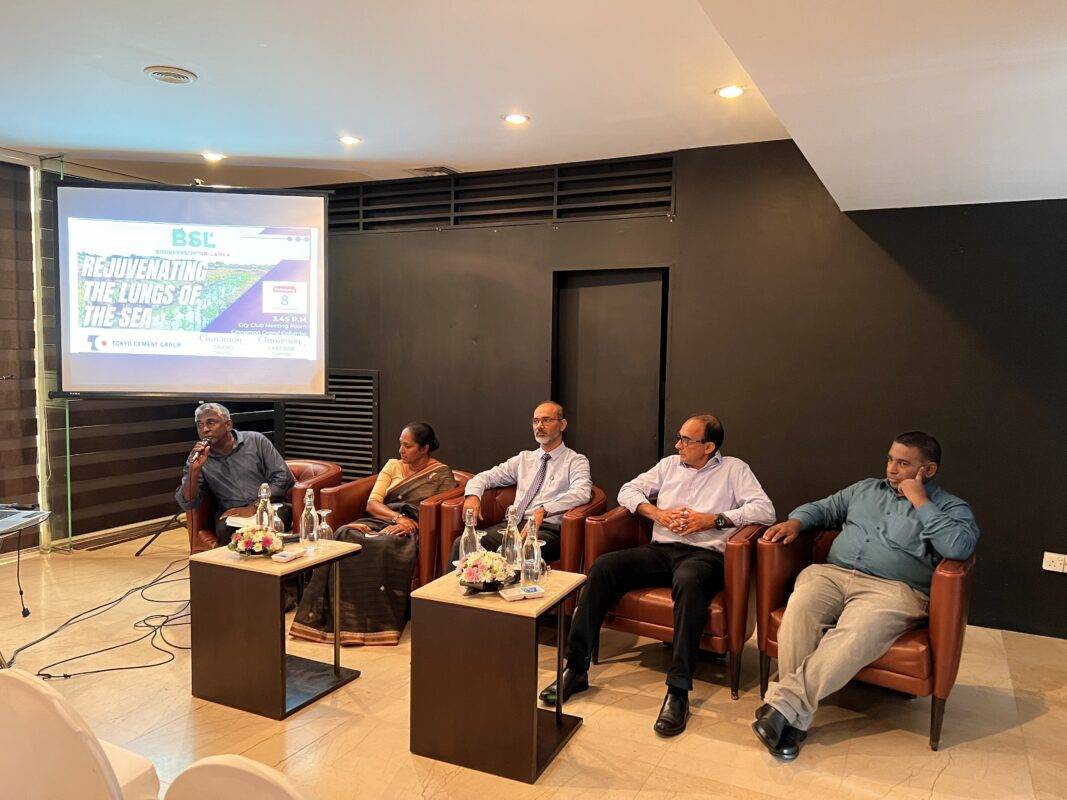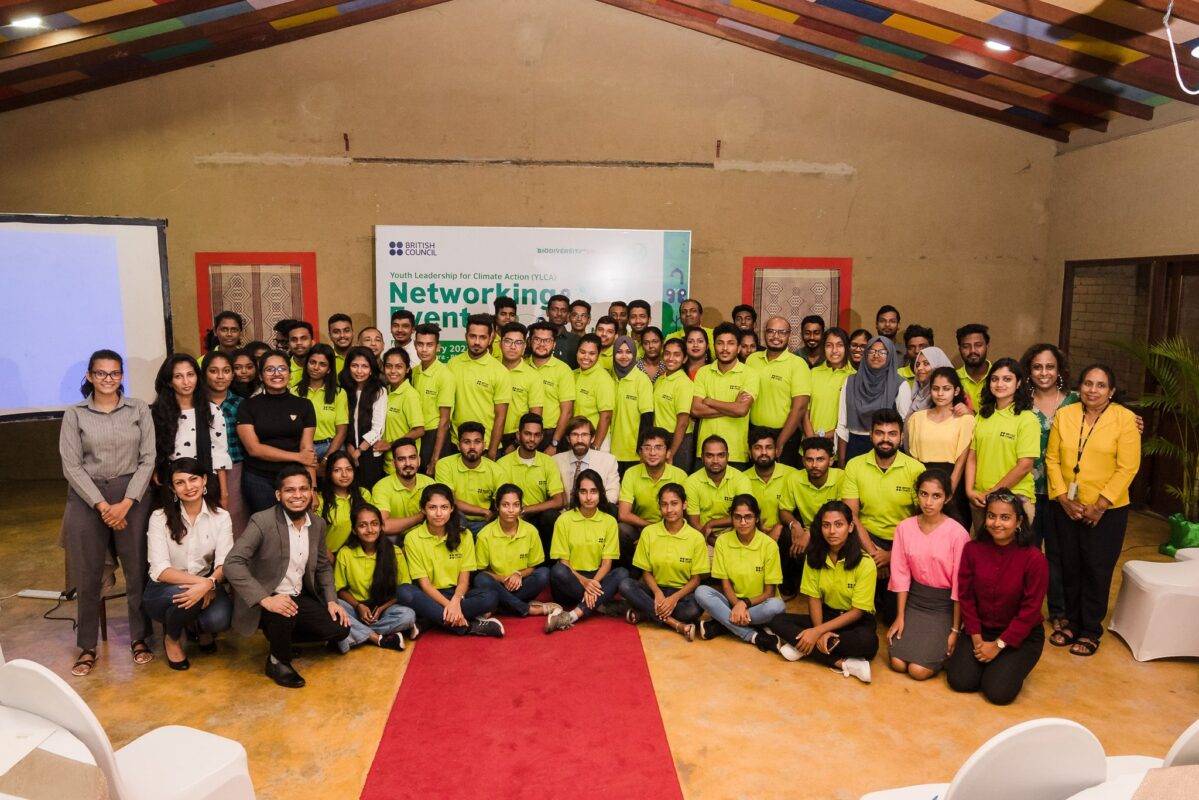
Biodiversity Sri Lanka celebrates World Wetlands Day, 2023 ‘Rejuvenating the Lungs of the Sea
Biodiversity Sri Lanka in partnership with Tokyo Cement Company (Lanka) PLC and Cinnamon Hotels and Resorts commemorated World Wetlands Day, 2023 ‘Rejuvenating the Lungs of the Sea’ on the 8th of February, 2023 at the Hotel Cinnamon Grand from 3.30 to 5.30 p.m.
A wetland is an area of land covered by salt or fresh water, either seasonally or permanently. It has its own vegetation types and rich biodiversity, along with its own distinct ecosystem. Wetlands provide shelter to a wide array of biota, including water birds, mammals, fish, and insects, and also act as pit stops for migratory birds.
Wetlands also act as natural filters, commonly referred to as the ‘kidneys of the Earth’, trapping pollutants such as heavy metals and excessive nitrogen and phosphorous. They also act as a source of food for animals and human beings, hydrologically regulate erosion and flood and drought conditions and enable carbon sequestration and climate regulation. These systems store a total of 11.52 pentagrams of carbon, which is equivalent to roughly four years of annual carbon emissions by the country.
Carbon sequestration rates of coastal wetlands and freshwater wetlands are higher than terrestrial forests. Waterlogging soils limit oxygen transmission and create an anaerobic condition. This condition slows down the decomposition rate of organic matter, leading to the build-up and storage of large amounts of organic carbon in wetland sediments. The hydrological connection between waterways and their associated floodplains plays an important role in terms of the exchange of carbon and nutrients (i.e., wetlands can trap carbon-rich sediments from catchments, but may also disperse carbon through water flow into floodplains)
From the existing 44.5 ha of degraded mangrove forest patches within the Anavilundawa wetland sanctuary, the Department of Wildlife Conservation (DWC) has been guiding Biodiversity Sri Lanka since February 2022 in initially restoring up to 10.0 ha, using accepted scientific principles, with the Wayamba University of Sri Lanka playing the role of an expert advisor with respect to the science component of the project. Advice on establishing the biodiversity, soil, and hydrology baseline of the land plots, providing technical inputs for land preparation and establishing and maintaining field mangrove nurseries, planting mangroves and maintaining mangrove fields, and controlling potential pests and diseases on mangrove plants will be provided together with continued guidance and support for periodic data gathering and monitoring. Spanning an initial period of five years, with financial resources from its Membership, the first two years will focus on planning, forging community partnerships, land preparation, nursery establishment, and planting activities.
In celebration of the completion of a productive year of BSL public-private partnership ‘LIFE to Our Mangroves’, the wetlands day event was held, with the participation of distinguished speakers Prof. Sevvandi Jayakody, Senior Lecturer, Wayamba University, Chitral Jayatilake, Head of Eco-Tourism, Cinnamon Hotels and Mr. Salinda Kandapola, Corporate Sustainability Manager, Tokyo Cement Company (Lanka) PLC.
The first presentation of the event was done by Mr. Chitral Jayatilake, where he spoke about the sustainability projects carried out by Cinnamon Hotels. He highlighted the various wildlife conservation initiatives carried out by Cinnamon Wild Yala and Cinnamon Lodge Habarana in particular. Mr. Jayathilake also talked about the Eco-Tourism based approaches carried out by Cinnamon hotels.
Prof. Sevvandi Jayakody made a detailed presentation on the Importance of Mangrove ecosystems and progression at the Anawilundawa mangrove restoration site since the start of the project, from the obstacles they faced whilst selecting the site to the current status. Professor Jayakody indicated the research activities happening on the site, including floral and faunal surveys and water and soil quality analyses. She also highlighted the community involvement in the project stressing the support given by the neighboring villagers in seed collection, nursery preparation, etc.
Mr. Kandapola highlighted the Mangrove Re-planting Project in Cod Bay, Trincomalee – a project carried out by Tokyo Cement Company (Lanka) PLC, since 2012. He elaborated on details from the start of the project, how it was carried out from nursery preparation, indicating the species of Mangroves that were planted in the site and progression during the past 10 years (2012 to 2022). He also talked about the faunal species that were found on the site and the current status of the area restored.
A special panel discussion was held with the participation of distinguished panelists Prof. Sevvandi Jayakody, Dr. Shamen Vidanage, Senior Lecturer, University of Kelaniya, Mr. Graham Marshall, Chair- Marine Sub Committee, Wildlife & Nature Protection Society, and Mr. Sanith de Silva Wijeyeratne, Director/CEO, The Climate & Conservation Consortium. The panel discussion was moderated by Prof. Devaka Weerakoon, Senior Professor in Zoology & Environmental Sciences, University of Colombo. Following the panel discussion, an open discussion was held with audience participation.

A Memorandum of Understanding (MoU) signed between the CCC and the CEA on the EPR Online Reporting Portal
A Memorandum of Understanding (MoU) was recently signed between the Ceylon Chamber of Commerce (CCC) and the Central Environmental Authority (CEA) on managing the EPR On-line Reporting Portal on the 18th of February 2023 at the CEA premises. The signing of the MoU was witnessed by Mr. Supun S. Pathirage, Chairman of the Central Environmental Authority (CEA), and Mr. Manjula De Silva, Secretary General/CEO of the Ceylon Chamber of Commerce. This MoU cements the relationship between the Parties for the handling of the EPR Reporting System.
The Online Plastic Waste Reporting Portal for the Extended Producer Responsibility (EPR) Obligatory Companies was developed by Virtusa (Pvt) Ltd. with funding from the Clean Cities Blue (CCBO) initiative of the United States Agency for International Development (USAID). The Ceylon Chamber and Biodiversity Sri Lanka (BSL) officially inaugurated the EPR system on June 16, 2022, for the environmentally responsible management of plastic waste. To access the online portal, visit www.epr.lk
The initiative aims to increase plastic waste collection and recycling to minimize plastic pollution at the national level. The online reporting portal has been endorsed by the Ministry of Environment (MoE) and the Central Environmental Authority (CEA) and welcomed by the private sector.
On January 26, 2023, the project conducted a meeting with the CEA officials who are handling the online portal and with the Virtusa team. The main objective of this meeting is to discuss some technical difficulties and give some technical instructions to the employees of CEA who are handling the EPR Portal. The training was led with the assistance of Virtusa.
CEA convened a meeting with PET and HIPS Consortium members to inform them that CEA has taken over the responsibility of managing the Online Reporting System and that they should report on manufacturing and collection figures into the Portal beginning in January 2022. The CEA intends for EPR-obligatory companies to begin reporting annual plastic consumption and collecting post-consumer plastic in January 2023. The initial phase will focus on two types of plastics, namely, Polyethylene Terephthalate (PET) and High Impact Polystyrene (HIPS) packaging. The outcome of voluntary EPR implementation will be documented to draw lessons that can be applied to a mandatory collection and reporting system in the future. The project and the CEA looked forward to any positive steps taken toward moving the national EPR process forward.

Progressing with Youth Leadership for Climate Action (YLCA)
Using British Council funds, Biodiversity Sri Lanka (BSL) is making progress on an initiative called Youth Leadership for Climate Action (YLCA), targeting young people living in the Colombo District. The programme intends to develop these young people into community leaders in climate action, through a series of residential training programs. Either individually or in groups, the candidates are expected to undertake a community intervention supporting climate action. We believe that through this programme, the young candidates will gain knowledge and skills to address local climate problems. The selected youth were provided with the chance to broaden their networks with other district YLCA teams recently at Mihilaka Medura, BMICH. Seventy-five young people from the Colombo, Gampaha, and Kandy districts attended this event.
After successfully completing the three training segments, which covered the journey of climate actions, the basics of project management, fundraising, environmental/social entrepreneurship, Equality, Diversity, and Inclusion (EDI), safeguarding and gender sensitivity communicating and networking through social media, etc., the candidates developed project proposals for community interventions climate issues. They will now put themselves into action. In presenting these community intervention ideas, the British Council created a platform in collaboration with BSL and WNPS. This serves as a networking opportunity.
Through a poster presentation at the event, the youth had the opportunity to share their intervention ideas with other youth and guests, network with them, and share their experiences. Additionally, it gave them the chance to network with well-known figures in fields connected to sustainability and the environment.



